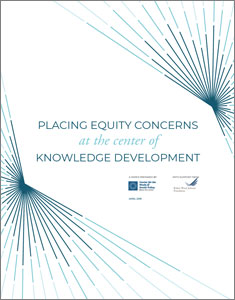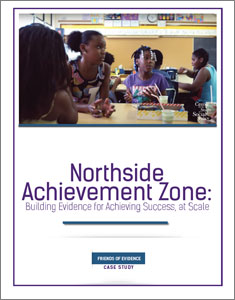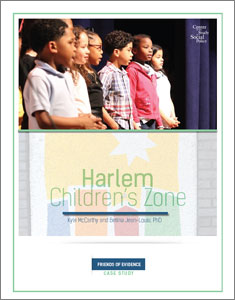The Friends of Evidence came together quite informally, beginning in 2011, under the impetus of Frank Farrow, President of the Center for the Study of Social Policy; Lisbeth B. Schorr, Senior Fellow, Center for the Study of Social Policy; and Joshua Sparrow, MD, Director of Strategy, Brazelton Touchpoints Center, Boston Children’s Hospital. The dozen of us who made up the Friends of Evidence from the outset had in common a passionate interest in improving outcomes for the children and families who were not faring well in today’s society, though we came at these challenges from diverse perspectives.
As we engaged each other in conversation and interviewed some of our colleagues to obtain a wider set of views, we found that our varied backgrounds and experiences had led us to shared observations and convictions about the role of evidence in efforts (public and philanthropic, local, regional, and national) to improve outcomes and to ensure the wise allocation of scarce resources. We also found that a growing number of distinguished leaders, across diverse fields, disciplines, and sectors, were drawing similar conclusions about the limitations of the recent evidence mindset, and were seeking each other out to define a more effective one. We were eager to explore these issues together and agreed to meet periodically and to seek support, hoping that our explorations would lead us to some critical insights that we might sharpen and
act on with others.
Members of the Friends of Evidence
Susan Bales
Founder & Senior Advisor
FrameWorks Institute
Donald M. Berwick, MD, MPP
President Emeritus & Senior Fellow
Institute for Healthcare Improvement
Angela Glover Blackwell
Founder in Residence
PolicyLink
Anthony Bryk
President
Carnegie Foundation for the Advancement of Teaching
Deborah Daro
Senior Research Fellow
Chapin Hall, University of Chicago
Kathleen P. Enright
President and CEO
Council on Foundations
Frank Farrow
President
Center for the Study of Social Policy
Thaddeus Ferber
Vice President for Policy
The Forum for Youth Investment
Lawrence Green, DPH
Professor Emeritus of Epidemiology and Biostatistics
UCSF School of Medicine
Michele Jolin
Founder and Managing Partner
Results for America
John Kania
Executive in Residence
New Profit
Nat Kendall-Taylor
Research Director
FrameWorks Institute
Patti Patrizi
Patrizi and Associates
Charles Payne
Professor, School of Social Service Administration
University of Chicago
Karen Pittman
President and CEO
The Forum for Youth Investment
Donald J. Peurach, PhD
Associate Professor
School of Education, University of Michigan
Alice Rivlin (deceased)
Former Director, Office of Management and Budget
Brookings Institution
Joshua Sparrow, MD
Executive Director, Brazelton Touchpoints Center
President, Brazelton Touchpoints Foundation
Boston Children’s Hospital
Report
Placing Equity Concerns at the Center of Knowledge Development
April 2019
In this report, we turn our attention to considering what it means to “place equity concerns at the center” of improving outcomes for those who are the most marginalized.
(21 pp)
Brief
Northside Achievement Zone (NAZ): Building Evidence for Achieving Success, at Scale
2016
This brief looks at how NAZ uses and generates evidence to accomplish its goals. It explores five characteristics of an inclusive approach to evidence—characteristics encountered in initiatives considered “evidence innovators.”
(7 pp)
Brief
Friends of Evidence Case Study: Harlem Children’s Zone
2016
This brief looks at how HCZ uses and generates evidence to achieve its goals. Its analysis is organized around five characteristics found in initiatives considered “evidence innovators.”
(8 pp)
Brief
Evidence Case Study: Summary
This brief compiles case studies from various initiatives and makes the concept of a “culture of evidence” accessible with illustrations of an approach to improve equitable outcomes for families and communities.
(5 pp)
Brief
Catawba County Child Wellbeing Project
2017
This brief explores how the initiative uses and generates evidence in order to achieve its goals and how it came to choose the "Success Coach" model.
(7 pp)
Report
Carnegie Math Pathways
2016
This report investigates Pathways through the lens of how it uses and generates evidence to achieve its goal of building a substantial infrastructure to support and embed quality improvement.
(9 pp)
Report
Better Evidence for Decision-Makers
July 2016
This report explains why decision-makers need better support and to be truly "evidence-informed," as well as specific recommendations about how to move forward.
(15 pp)
Brief
Better Evidence for Decision-Makers: Emerging Pathways
March 2017
This brief explains the need for "a broader range of evidence" for decision-makers, examples of what that looks like, and recommendations on policy and policy implementation.
(12 pp)
Brief
Asthma Improvement Collaborative (AIC)
2016
This brief details the AIC's powerful approaches to evidence and their efforts to improve outcomes among disadvantaged children, families, youth, and neighborhoods.
(7 pp)
Report
An Evidence Framework to Improve Results
November 2014
This report explores the question of how we use a framework of continuous learning to obtain and apply the kinds of evidence that will be most useful in achieving significantly greater outcomes.
(48 pp)
Report
Expanding the Evidence Universe: Doing Better By Knowing More
December 2011
This report provides recommendations related to expanding the knowledge base necessary to improve outcomes for children, families, and communities and was written for discussion at the Harold Richman Public Policy Symposium, the first in a series of forums honoring the memory of Harold Richman, co-founder of CSSP.
(60 pp)



